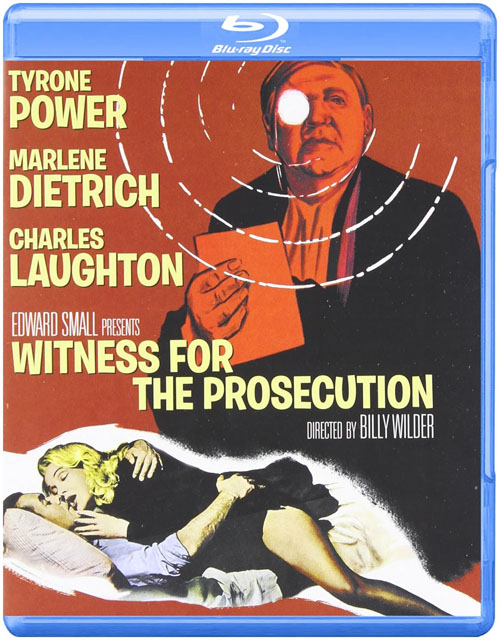
“WILFRID
THE FOX”
By
Raymond Benson
Director
Billy Wilder was on an incredible streak during the decade of the 1950s. Some
of his most notable works were made between 1950-1959, and his 1957 courtroom
drama, Witness for the Prosecution, is one of the high points.
Based
on the 1953 stage play by Agatha Christie (which, in turn, was based on one of
her short stories), Wilder’s film version actually improves a bit on the
already engaging theatrical work. (By the way, the stage play is currently
enjoying a long and successful run in London at County Hall’s old courthouse
and actual courtroom, and this reviewer can attest that it is a magnificent
production, definitely worth seeing in those authentic environs.)
Tyrone
Power received top billing as Leonard Vole, the accused (Power, an American,
plays the role as one as well). The fabulous Marlene Dietrich is Christine, the
“witness for the prosecution.” But make no mistake—this movie belongs to
Charles Laughton, who received third billing. Laughton plays barrister Sir
Wilfrid Robarts, who is the senior counsel for Vole. As his private nurse, Miss
Plimsoll (Elsa Lanchester) declares during the trial when Wilfrid makes a
slam-dunk move, “Wilfrid the Fox! That’s what they call him, and that’s what he
is!”
The
nurse character is something that screenwriters Wilder and Harry Kurnitz
(adapted for the screen by Larry Marcus) added to the story, as well as turning
Sir Wilfrid’s character to be more of a protagonist. Seeing that Laughton and
Lanchester were married in real life, their chemistry and constant bantering
together is priceless, providing the film with comedic elements that the play
never had.
Vole
is accused of murdering a wealthy widow that he befriended. She had become
besotted with him and made him a beneficiary of her will. Vole is married to
German immigrant Christine, who at first provides an alibi for Vole. Sir
Wilfrid, despite recovering from a heart attack and is not in the best shape
for a highly publicized trial, takes the case of defending Vole. It’s a shock
to Wilfrid when the prosecution calls Christine to testify against her husband—because
she is actually married to someone else back in East Germany, dodging the law
that a wife can’t testify against a spouse. To reveal any more of the twists
and turns—and especially the surprise ending—would spoil the fun. (In fact, a
voiceover announces at the end of the movie that the “management of this
theater” suggests that the secret of the ending not be revealed to friends!)
All
three of the leads are particularly outstanding, and they are strongly
supported by not only Lanchester, but also John Williams, Henry Daniell, Torin
Thatcher, Una O’Connor, and Ian Wolfe. Wilder’s direction is a lesson in
pacing, the rise and fall of tempo and suspense, and his guidance of the
actors. Dietrich, in fact, would not agree to do the picture unless Wilder was
hired as director.
The
film was popular in 1957. It received Academy Award nominations for Best
Picture, Best Director, Best Actor (Laughton), Best Supporting Actress
(Lanchester), Best Editing, and Best Sound. Curiously, the screenplay wasn’t
nominated. Lanchester did receive the Golden Globe award for her stellar
performance.
Kino
Lorber Studio Classics has issued a Special Edition Blu-ray that replaces their
earlier 2014 release. The contents are exactly the same except an audio
commentary by film historian Joseph McBride (author of Billy Wilder: Dancing
on the Edge) has been added. Previous supplements included are a short
piece of Wilder discussing the film with director Volker Schlöndorff,
and the theatrical trailer. The restoration itself looks marvelous in glorious
black and white.
Witness
for the Prosecution is
a must-have for fans of Billy Wilder, Charles Laughton, Marlene Dietrich,
Agatha Christie, and courtroom thrillers. Great fun all around.
Click here to order from Amazon